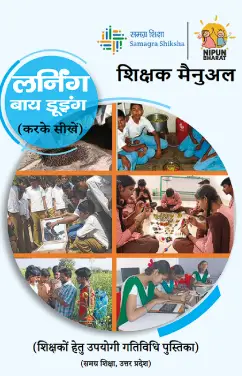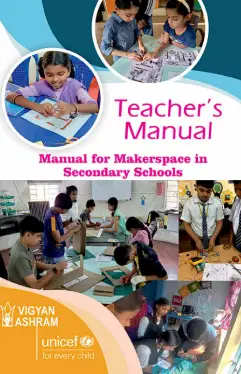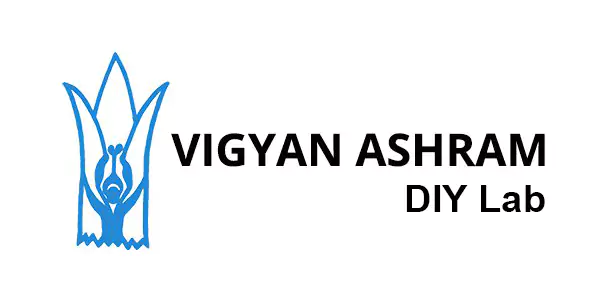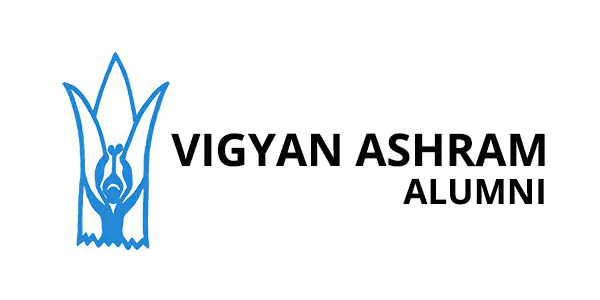Program for Schools
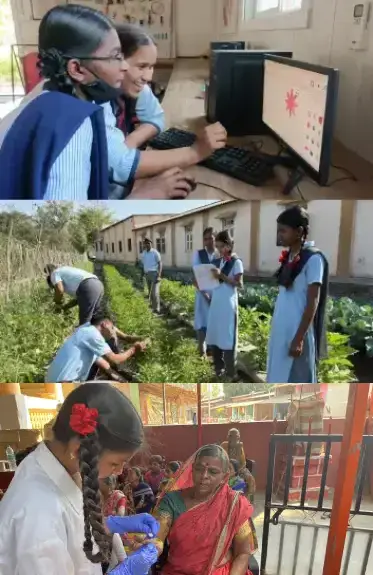
Vigyan Ashram is a ‘Laboratory of Education’. We follow the ‘Learning while Doing’ Philosophy of education at Vigyan Ashram, Pabal campus. We believe ’ Learning while Doing’ is a ‘Natural way of Learning’. A child learns his/her mother tongue by the same method. We learn many things in our day to day life by ‘Learning while doing’ method. This method of education is so effective that it can train even those who are not able to learn by ‘Book Centered method’ of education.
We have very encouraging results of using the ‘Learning while Doing’ approach of education at our own campus. Many school dropouts become innovators, entrepreneurs by this method. Main reason of school dropout is the book centric nature of education. Vigyan Ashram wants students should not dropout of school and get good quality of education in school.
Therefore, Vigyan Ashram is working to introduce the ‘Learning while Doing’ method of education in formal schools.
Advantages of the ‘Learning While Doing’ method of Education
i) It is the ‘Natural way of Learning’.
ii) Students learns without getting burdened with rote learning, memorization
ii) Activity to hand Stimulates the intellect – It helps in increasing the intelligence of students
iii) Teamwork, Collaboration, and communication skills can only be developed by taking part in real-life work.
iv) “Learning while Doing” approach helps in developing 21st-century skills like critical thinking, creativity, and empathy.
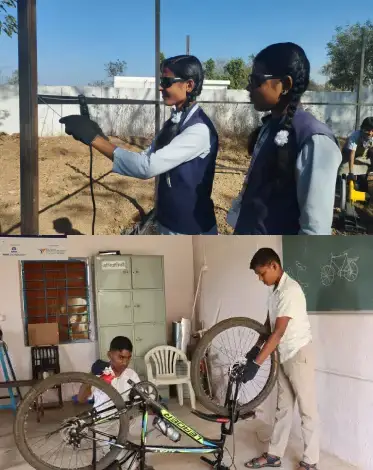

Vigyan Ashram is implementing the following program for Schools
i) Vocational Program for Schools – Introduction to Basic Technology (IBT) : Grade 6 – Grade 10
ii) STEM Education Program – ‘Learning by Doing’ : Grade 6 – 8th
iii) Mentoring for ‘Atal Tinkering Labs’
iv) Setting up and training of Low cost Makerspaces
Vocational Program for School

1. Introduction to Basic Technology (IBT) / Multi Skills Foundation Course (MSFC) / Multi Skills Assistant Technician (MSAT) : Grace 8 - 10th
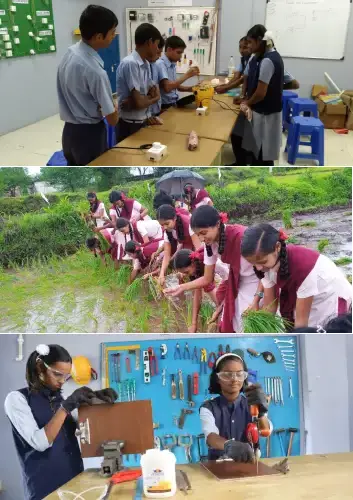
Vigyan Ashram has been implementing vocational programs in schools since 1987.
Introduction to Basic Technology (IBT) is pre-vocational training program designed for high-school students. IBT programme introduces advanced technology applications through learning-while-doing methodology of education. Some of the silent feature of IBT program are-
- Multi-skill training approach with integration of regular school curriculum.
- STEM (Science, Technology, Engineering, Mathematics) & socially useful work activities.
- Community Services – students providing various services to the community as part of their learning.
It was started with 3 schools in 1987. The program got recognition as a Subject by ‘Maharashtra State Board of Secondary and Higher Secondary Education’. The name of the subject was ‘Introduction to Basic Technology (IBT)’.
IBT subject can be taken as a Subject for Grade 8th – 10th. There was board examination for 10th Grade.
Vigyan Ashram provided all necessary support to school like curriculum development, instructor training, technology adoption etc.
Evolution of IBT
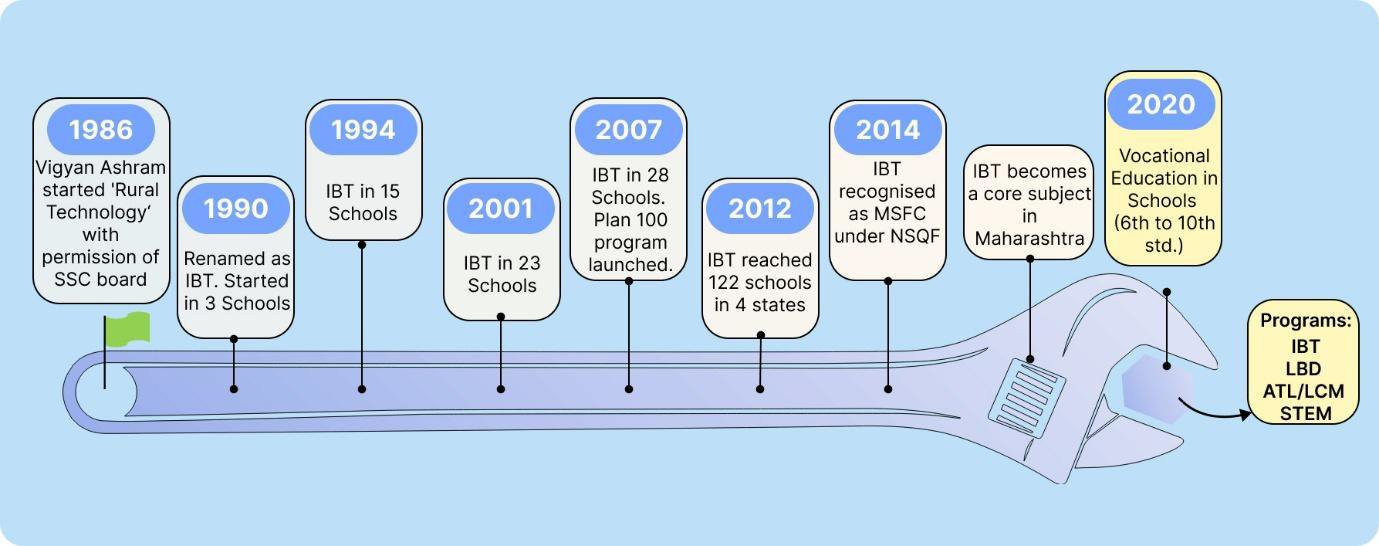
IBT program got evolved over time. It was implemented in hundreds of schools from Maharashtra, Karnataka, Chattisgarh and many others.
IBT program is adopted by multiple agencies and schools.
Watch the Documentary of IBT program in Chattisgarh
2. Vocational Program in Schools from Grade 6
Learning by Doing - LBD program in Uttar Pradesh

The NEP 2020 and NCF 2023 now emphasize vocational education starting from Grade 6 and encourage project-based learning. Vocational education is now become a compulsory curricular subject from Grade 6.
Vigyan Ashram is working with Stars forum to implement ‘Learning By doing’ program from Grade 6 since 2021 in secondary schools of Uttar Pradesh. The program started with the objective to provide flexible learning opportunities including pre-vocational and life skill education, to students through project-based learning methodologies. Students are learning various curricular concepts through various hands-on activities. These activities are in the areas of Engineering, Energy, Environment, Agriculture, food processing and health. Activities are designed considering age of students and linked to syllabus.
Learning by Doing (LBD) intervention was started in 60 upper primary schools of 15 districts of Uttar Pradesh from July 2021. The program later scaled up to 1772 upper primary and composite schools and 570 PM Shri Schools in 2024-25.
Vigyan Ashram and Stars forum has conducted training of 2400 school teachers to implement LBD program in 2024-25.
3. STEM Learning program
Vigyan Ashram is supporting STARs forum and many other NGOs to implement STEM program in various schools across country.
Vigyan Ashram has designed training program for school teachers on STEM activities.
Vigyan Ashram has developed various learning resources to conduct these activities.
Vigyan Ashram believes that STEM activities should not remain limited to models / prototypes and toys. But STEM activities should be linked to day to day work in the school and home. Taking part in the productive tasks is important component of STEM training program designed by Vigyan Ashram. We also use new technologies like digital fabrication, electronics and A.I tools to make education more meaningful.
Vigyan Ashram is providing training and content development services in following places
i) Murshidabad District , West Bengal – 100 schools with the support of Unicef, Samagra Shiksha and Stars forum
ii) KGBV schools , Jharkhand – 84 girls residential schools in 6 districts of Jharkhand. In colloboration with Unicef, Samagra shiksha and Stars forum
iii) 10 schools in Talegaon region of Maharashtra – With the support of Schaeffler and Stars forum
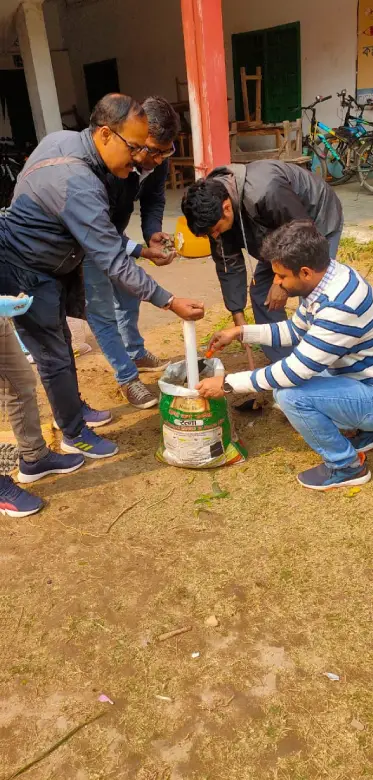
4. Mentoring of Atal Tinkering Lab
Vigyan Ashram has been running a DIY Lab in Pune city since 2012. Vigyan Ashram has started using 3D printers in schools since 2016. We are regularly conducting teachers training programs on using Tinkering as a part of the Teaching Learning methodology. Training of teachers includes use of electronics, microcontrollers, programming and digital fabrication. We have developed various learning resources for use in the schools. Following are some of the major initiatives taken by Vigyan Ashram
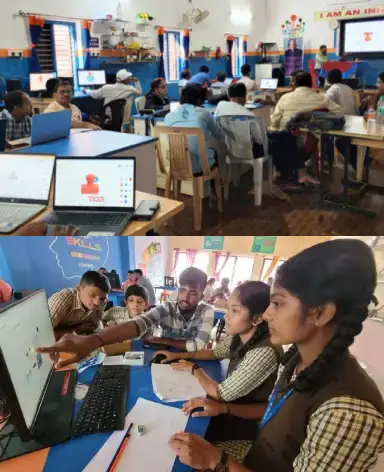
Monitoring and Support:
VA helps state governments in monitoring ATL schools and their performance. Regular field visits and review meetings by Vigyan Ashram field teams along with officials foster accountability and continuous improvement in ATL functionality.
Hub and Spoke Model:
We support a district-level innovation ecosystem through the Hub and Spoke ATL model. Each hub connects with a minimum 5 Spoke ATLs. Vigyan Ashram trains the Hub ATL schools so that they can extend the reach of capacity-building and fostering local innovation networks by developing the Spoke ATL schools.
Teacher Training , Make-a-thons and Special Camps for students and teachers:
Vigyan Ashram conducts statewide teacher training workshops (State, Regional and District Level), Special camps in summer and winter holidays, Make-a-thons to engage teachers and students in problem identification, design thinking, and prototyping. We also provide technical support and mentoring for national level competitions like School Innovation Marathons, Seed the Future Entrepreneurship Program, etc.
Online Sessions:
Vigyan Ashram develops and delivers the DIY-focused online sessions via official government channels such as Jnanadeepa channel in Karnataka (for Kannada sessions) and Diksha channel in AP (for Telugu sessions), expanding access to ATL learning across hundreds of schools with the support of UNICEF and Samagra Shiksha.
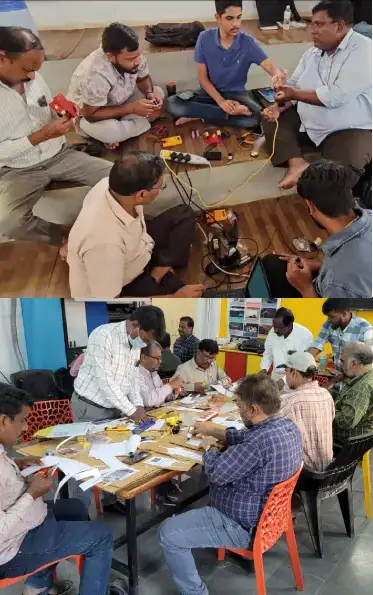
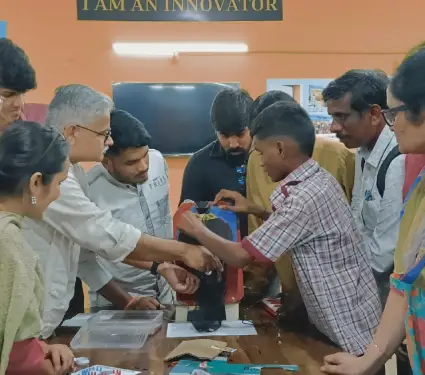
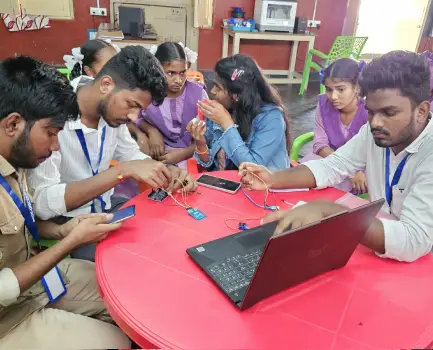
Curriculum Integration:
Vigyan Ashram helps in mapping ATL activities with existing school curricula to bridge classroom learning and hands-on tinkering and also to support teachers in embedding STEM practices in their daily teaching.
Capacity Building for Engineering Colleges:
With the support of UNICEF, Samagra Shiksha and State Departments of Higher Education, Vigyan Ashram also mentors engineering college students to form a cross-institutional innovation ecosystem. We have so far trained over 300 engineering students in AP and Karnataka. These second and third year engineering students visit ATL schools over a period of 6 months/year to mentor the ATL students and teachers.
ATL establishment and Training Infrastructure Development:
Vigyan Ashram helps in establishment of ATL lab including the selection and procurement of material, tools and equipment. We have established three State ATL training centres at Vijayawada, Hyderabad and Narasapura (Near Bangalore). These centers serve as state hubs for teacher training, make-a-thons, and
5. Low-cost Maker Space (LCM)
While Atal Tinkering Labs (ATLs) represent a transformative step toward experiential STEM learning in schools, they come with a high financial cost and a requirement of 1200–1500 sq. ft. space. Recognizing that such infrastructure is not feasible for all schools, especially in remote or under-resourced areas, Vigyan Ashram along with UNICEF has conceptualized and piloted a frugal yet effective alternative: Low-Cost Maker Spaces (LCMs) with basic tinkering and making skills with minimal resources and infrastructure.
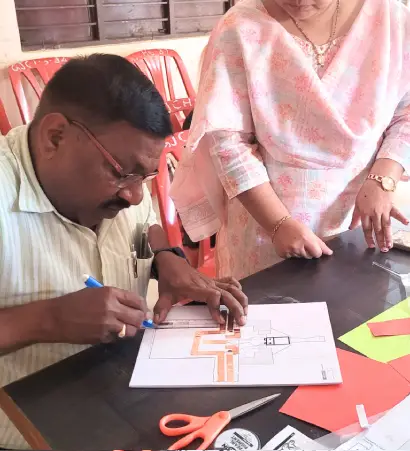
Why LCMs?
- Cost-Effective: LCMs offer a cost-effective alternative to ATLs (approx. 1/10th the cost of ATLs).
- Space-Efficient: Require only 200–250 sq. ft., making them suitable for schools with infrastructure limitations.
- Inclusive: Specifically designed to cater to marginalized students from Grades VI to IX in the schools managed by KGBV (Kasturba Gandhi Balika Vidyalaya), Social Welfare and Tribal Welfare Departments of the state.
- Scalable & Sustainable: Enables rapid expansion of maker spaces with state-level integration into school budgets and academic schedules.
Implementation and Impact
- Established LCMs: 20 each in Telangana and Karnataka, and 2 in Andhra Pradesh.
- Partnership Model: Implemented through collaboration with UNICEF, Samagra Shiksha, KGBV, Tribal and Social Welfare Departments.
- Curriculum Mapping: Vigyan Ashram developed the LCM curriculum to help teachers integrate maker space activities with core subjects.
- Operational Support: Schools receive guidance on usage, safety standards, and gradual progression from tool orientation to student-led projects.

Youtube Channels
Our Partners






